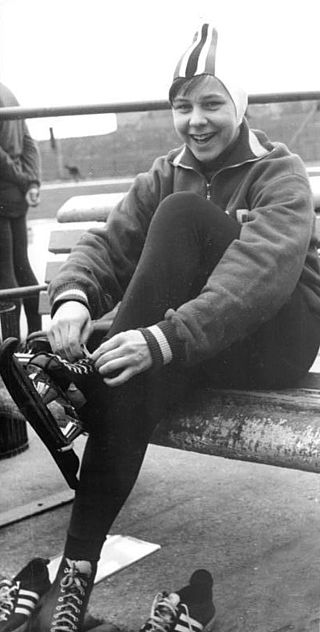Barbara Petzold is a former East German Cross-country skier who competed during the 1970s and early 1980s. She won two gold medals at the 1980 Winter Olympics in Lake Placid in the 10 km and the 4 × 5 km relay, and a bronze in the 4 × 5 km relay at the 1976 Winter Olympics in Innsbruck.

Johanna Klier is a former East German hurdler and Olympic gold medallist.

Henry Glaß is an East German former ski jumper who competed during the 1970s.
Evelin Kaufer is a retired East German sprinter who competed in the 100 metres.

Andrea Pollack was a butterfly swimmer from East Germany who won three Olympic gold medals.
Evelin Jahl is a German former discus thrower, who won two Olympic gold medals representing East Germany.
Henrietta Ebert is a German rower who won the gold medal at the 1976 Summer Olympics and was a member of the SC Dynamo Potsdam.

Ramona Balthasar-Franz is a German rower.
Ute Schell is a German rower, who competed for the SG Dynamo Potsdam / Sportvereinigung (SV) Dynamo. She has won several medals at international rowing competitions. She was first coached by Herta Weissig and then Wolfgang Schell.
Gabriele "Gabi" Kühn is a German rower who competed for East Germany in the 1976 Summer Olympics and the 1980 Summer Olympics.
Roswietha Zobelt is a German rower who competed for East Germany in the 1976 Summer Olympics and in the 1980 Summer Olympics.
Manfred Merkel is a retired slalom canoeist who competed for East Germany.

Ruth Schleiermacher is a former East German speedskater. She took part in eight international championships. Twice at the European Championships, thrice at the World Allround Championships, once at the World Sprint Championships (1971) and two times at the Winter Olympics, 1968 and 1972.

Inge Görmer is a former East-German speedskater. She took part in five international championships. Four times as East-German at the World Allround Championships and once, as member of the German Unified team, at the Winter Olympics (1960).
Cornelia Klier is a German rower. She married in 1980 prior to attending the Olympic Games and used her married name in Moscow.
The men's 1500 metres in speed skating at the 1988 Winter Olympics took place on 20 February, at the Olympic Oval.
The Women's 500 metres in speed skating at the 1988 Winter Olympics took place on 22 February, at the Olympic Oval.
The women's 1000 metres in speed skating at the 1988 Winter Olympics took place on 26 February, at the Olympic Oval.
The women's 3000 metres in speed skating at the 1988 Winter Olympics took place on 23 February, at the Olympic Oval. 25 competitors from 14 nations participated in the event.
The women's 5000 metres in speed skating at the 1988 Winter Olympics took place on 28 February, at the Olympic Oval. 25 competitors from 15 nations participated in the event.







